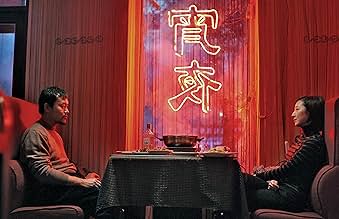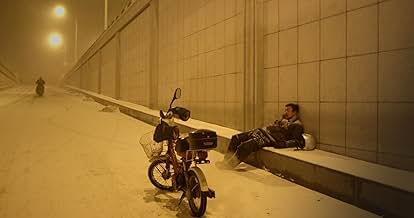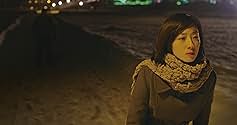NOTE IMDb
6,7/10
10 k
MA NOTE
Un ancien flic et son coéquipier décident de poursuivre l'enquête sur une série de meurtres qui ont mis fin à leur carrière et leur ont causé préjudice, lorsque des meurtres identiques sont ... Tout lireUn ancien flic et son coéquipier décident de poursuivre l'enquête sur une série de meurtres qui ont mis fin à leur carrière et leur ont causé préjudice, lorsque des meurtres identiques sont commis à nouveau.Un ancien flic et son coéquipier décident de poursuivre l'enquête sur une série de meurtres qui ont mis fin à leur carrière et leur ont causé préjudice, lorsque des meurtres identiques sont commis à nouveau.
- Réalisation
- Scénario
- Casting principal
- Récompenses
- 28 victoires et 46 nominations au total
Avis à la une
There are definitely some impressive technical flourishes here. The lighting and the colors used are gorgeous, and really do highlight a lot of the film's atmosphere, which is the other good thing about it. It's able to achieve atmosphere in a rather surprising way, but it's just too bad hat that atmosphere is wasted and doesn't really highlight much. The acting is decent, but the story and the screenplay leave a lot to be desired. The characters just aren't developed all that well, and just are so, so dull. The film's sense of pacing and development are non- existent. I don't think this is anything worthwhile, although I'm sure many will like it just fine.
This 2014 Golden Berlin Bear winner (with a rare second Silver Berlin Bear award of BEST ACTOR for Fan Liao) is Chinese director Yi'nan Diao's third feature, and his first to be shown in cinemas and harvested over one hundred million RMB, roughly equivalent to 16 million dollars, thanks to the international accolades it received. Its original title can be translated verbatim as "White Day Fireworks", it is the name of a nightclub which would be revealed as a crucial thread to a murder case, furthermore Diao arranges a literal daytime firework show to climax the film in the coda, meanwhile, its official English title: Black Coal, Thin Ice, betrays the locations which relation all the murder cases during a five-year span.
The film starts in 1999, in an unspecified city in China's North-east province Heilongjiang, Zhang (Liao) is a recently-divorced policeman, during a fresh case of a dismembered body scattered in sundry collieries where an I.D. card indicates the dead is Liang (Xuebing Wang), but due to his negligence, two fellow policemen are killed in operation while Zhang is also wounded. After that, the time jumps to 2004, now Zhang is a life-beaten drunkard and works as a security guard, two new dismembered bodies have been found, all link back to Liang's wife Wu (Gwei), whose mysterious mien attracts Zhang, he embarks on a personal investigation to follow her, strike up a conversation with her in the dry-cleaner where she works, and eventually ask her out for an ice-skating date. But at the same time, danger is lurking around him too, is Liang really dead? Or is Wu as innocent as she looks? Can all the mysteries be brought into daylight in the end or is there another lie involved? Diao smugly leaves an semi-opening end with many spurious clues (e.g. the cremains Wu buried under the tree Vs. her apparent lie of discarding it over the sea during the inquiry), to prompt viewers for disparate interpretations.
This film is to a great extent inscribed as an art-house fare with its lurid background or foreground colour embedding in almost every scene, the visual palette is meticulously chosen and also overtly, Diao is a faithful apprentice of symbolism, from a battered ladybug on the bedsheets in the opening sequence, to an abrupt introduction of a deserted horse left by junkmen, until the firework finale reaches the hallmarks of its veiled fatalism pretentiousness buried in his not-so-justifiable script, there must be a more plausible reason behind a redemption by right of admitting a murder one might not execute, it unfortunately gives an impression of a desperate trick to glaze over the banality of the story, to romanticize the damsel-in-distress reverie.
The whole story is a dancing-on-the-edge between a sex-driven anti-hero and a irresolute femme fatale, with a jarring red herring which leads to nowhere. But the two leads are giving fantastic performances, Fan Liao breathes out the irascible mentality stinkingly inflicted on a non-starter who clings to the last straw and strives to feel the ardor of living again. While Lun Mei Gwei from Taiwan, may seem to be an odd choice for a North-east girl, heedfully, she doesn't have many lines to give away her southern accent, instead, relies on her body language and facial expressions, her air of mystique is the most enticing feature entraps audience even in the film's banalest moment.
Winning over the likes of BOYHOOD (2014, 8/10) and THE GRAND BUDAPEST HOTEL (2014, 8/10) in Berlin inevitably becomes an over-achievement for this intense crime-thriller, but put it among its Chinese peers of the same year, the film can excel most of them hands down, as one of the must-see from the over-ballooning market where ingrainedly burdened with shoddy soil damages its own commodities.
The film starts in 1999, in an unspecified city in China's North-east province Heilongjiang, Zhang (Liao) is a recently-divorced policeman, during a fresh case of a dismembered body scattered in sundry collieries where an I.D. card indicates the dead is Liang (Xuebing Wang), but due to his negligence, two fellow policemen are killed in operation while Zhang is also wounded. After that, the time jumps to 2004, now Zhang is a life-beaten drunkard and works as a security guard, two new dismembered bodies have been found, all link back to Liang's wife Wu (Gwei), whose mysterious mien attracts Zhang, he embarks on a personal investigation to follow her, strike up a conversation with her in the dry-cleaner where she works, and eventually ask her out for an ice-skating date. But at the same time, danger is lurking around him too, is Liang really dead? Or is Wu as innocent as she looks? Can all the mysteries be brought into daylight in the end or is there another lie involved? Diao smugly leaves an semi-opening end with many spurious clues (e.g. the cremains Wu buried under the tree Vs. her apparent lie of discarding it over the sea during the inquiry), to prompt viewers for disparate interpretations.
This film is to a great extent inscribed as an art-house fare with its lurid background or foreground colour embedding in almost every scene, the visual palette is meticulously chosen and also overtly, Diao is a faithful apprentice of symbolism, from a battered ladybug on the bedsheets in the opening sequence, to an abrupt introduction of a deserted horse left by junkmen, until the firework finale reaches the hallmarks of its veiled fatalism pretentiousness buried in his not-so-justifiable script, there must be a more plausible reason behind a redemption by right of admitting a murder one might not execute, it unfortunately gives an impression of a desperate trick to glaze over the banality of the story, to romanticize the damsel-in-distress reverie.
The whole story is a dancing-on-the-edge between a sex-driven anti-hero and a irresolute femme fatale, with a jarring red herring which leads to nowhere. But the two leads are giving fantastic performances, Fan Liao breathes out the irascible mentality stinkingly inflicted on a non-starter who clings to the last straw and strives to feel the ardor of living again. While Lun Mei Gwei from Taiwan, may seem to be an odd choice for a North-east girl, heedfully, she doesn't have many lines to give away her southern accent, instead, relies on her body language and facial expressions, her air of mystique is the most enticing feature entraps audience even in the film's banalest moment.
Winning over the likes of BOYHOOD (2014, 8/10) and THE GRAND BUDAPEST HOTEL (2014, 8/10) in Berlin inevitably becomes an over-achievement for this intense crime-thriller, but put it among its Chinese peers of the same year, the film can excel most of them hands down, as one of the must-see from the over-ballooning market where ingrainedly burdened with shoddy soil damages its own commodities.
An ex-detective re-investigates a strange unsolved murder case that effectively ended his career five years previously. In doing so he ends up becoming increasingly involved with a young woman who seems to be connected with a series of similar killings.
It was good to see an example of a Chinese neo-noir. My previous experience with films from China has been usually of movies of epic proportions with big production values. So it made for a refreshing change to see something more low-key and contemporary. This one sets out its stall very well with the sinister discovery of various body parts being found in bags of coal spread all over the country, huge distances apart. The introduction of a femme fatale into the mix only ups the intrigue level further. And I have to say that on the whole I did enjoy this film and found it compelling, with its Chinese origins ensuring that it was a little different and punctuated with unpredictable moments. By the end of the piece it would be only fair to say that some questions still remain. I thought the ending was really very strange indeed with an odd final few moments and an ambiguous feeling. It almost feels like a superfluous ending but maybe I missed something in it. In truth odd things happen on a number of occasions throughout this one and reasons are not always very forthcoming, I am guessing this is a film that would benefit from a re-watch possibly. Also good was the wintry atmosphere of the snowy locales where the action unfolds that created a feeling all of its own which worked well. But I would probably have to conclude that, while I definitely liked this one, it does falls short of being great. It's not really that suspenseful for this type of film and the plot development doesn't ultimately reveal all that good a mystery in the final analysis. Certainly a good enough movie I have to emphasise but it just has a few hard to ignore unsatisfying flaws as well though.
It was good to see an example of a Chinese neo-noir. My previous experience with films from China has been usually of movies of epic proportions with big production values. So it made for a refreshing change to see something more low-key and contemporary. This one sets out its stall very well with the sinister discovery of various body parts being found in bags of coal spread all over the country, huge distances apart. The introduction of a femme fatale into the mix only ups the intrigue level further. And I have to say that on the whole I did enjoy this film and found it compelling, with its Chinese origins ensuring that it was a little different and punctuated with unpredictable moments. By the end of the piece it would be only fair to say that some questions still remain. I thought the ending was really very strange indeed with an odd final few moments and an ambiguous feeling. It almost feels like a superfluous ending but maybe I missed something in it. In truth odd things happen on a number of occasions throughout this one and reasons are not always very forthcoming, I am guessing this is a film that would benefit from a re-watch possibly. Also good was the wintry atmosphere of the snowy locales where the action unfolds that created a feeling all of its own which worked well. But I would probably have to conclude that, while I definitely liked this one, it does falls short of being great. It's not really that suspenseful for this type of film and the plot development doesn't ultimately reveal all that good a mystery in the final analysis. Certainly a good enough movie I have to emphasise but it just has a few hard to ignore unsatisfying flaws as well though.
Black Coal, Thin Ice is the kind of film that can only be felt, the charming point of the film is the indescribable feeling you get from the unique atmosphere. It's a suspense film with sort of Film-Noir feeling, but the plot of the case actually is not so important. As I said, what matters is the feeling. Those empty street shots, environment background sounds, strange acts and even some dark humor tastes. It even looks like a Jia Zhangke's film sometimes.(Well, Jia Zhangke's name did appear in the thank list in the end credits.) Such feeling reached the top in the ending of the pyrotechnical in daytime, it not only reflect the title (The Chinese title is Bai ri yan huo, which means The Daylight Pyrotechnix.) but also release the depressed emotion and atmosphere. (The Uncut Version has very strange but interesting dark humor style scenes in the ending, but they are cut out in the Censored Mainland China Theatrical Version.)
The atmosphere in the film is nearly perfect, however the romance relationship between two characters is not believable at all. The whole film is based on that relationship, but it didn't convince me. Without the reliable relationship, the rest of the film seems not make sense at all. So yeah, it's a rare and unique film in Chinese cinema, it is well did in many aspects, but I don't think it is qualified for Golden Berlin Bear.
My score: 7.5 for the Uncut Version, 7.3 for the Mainland China Censored Theatrical Version.
The atmosphere in the film is nearly perfect, however the romance relationship between two characters is not believable at all. The whole film is based on that relationship, but it didn't convince me. Without the reliable relationship, the rest of the film seems not make sense at all. So yeah, it's a rare and unique film in Chinese cinema, it is well did in many aspects, but I don't think it is qualified for Golden Berlin Bear.
My score: 7.5 for the Uncut Version, 7.3 for the Mainland China Censored Theatrical Version.
It seems that, every few years, there are one or two Chinese films that, despite being slow-paced, dark, and lacking A-list stars, somehow manage to attract a large domestic audience without being controversial enough to risk complete censorship. In 2014, the only example I have seen so far is this, Black Coal, Thin Ice. The reason for its domestic success is presumably because of its awards at the Berlin Film Festival.
As the story unfolds, despite being based around a series of murders, the film has a pace more similar to an art-house film than a crime- thriller. A couple of scenes were impressively disturbing, made even more so by the slow paced, subtle atmosphere surrounding them.
The setting of a polluted, dark, seedy city in a long Heilongjiang winter seems perfect for the noir tone of the film. A subtle musical score, with some dissonant strings combined with (terrible) Chinese pop songs (intra-diegetic) creates a fantastic atmosphere. The closest thing to it I have seen is Suzhou River, which, now I come to think of it, has a lot of similar motifs (I haven't seen Diao Yinan's previous films).
The acting performances were all impressive, the female lead (played by Taiwanese Gwei/Gui Lun-Mei) seemed suitably out of place in the Far Northeast of Mainland China. Liao Fan's male lead, and Wang Xuebing's character, were both impressive.
Despite a bit of dark humour that made me giggle, Black Coal, Thin Ice is a relentlessly grim and slightly disturbing film. I was impressed that it wasn't (more) censored in China, as it paints a pretty depressing picture. Despite being enthralled by the film, I won't be booking a flight to Heilongjiang any time soon.
As the story unfolds, despite being based around a series of murders, the film has a pace more similar to an art-house film than a crime- thriller. A couple of scenes were impressively disturbing, made even more so by the slow paced, subtle atmosphere surrounding them.
The setting of a polluted, dark, seedy city in a long Heilongjiang winter seems perfect for the noir tone of the film. A subtle musical score, with some dissonant strings combined with (terrible) Chinese pop songs (intra-diegetic) creates a fantastic atmosphere. The closest thing to it I have seen is Suzhou River, which, now I come to think of it, has a lot of similar motifs (I haven't seen Diao Yinan's previous films).
The acting performances were all impressive, the female lead (played by Taiwanese Gwei/Gui Lun-Mei) seemed suitably out of place in the Far Northeast of Mainland China. Liao Fan's male lead, and Wang Xuebing's character, were both impressive.
Despite a bit of dark humour that made me giggle, Black Coal, Thin Ice is a relentlessly grim and slightly disturbing film. I was impressed that it wasn't (more) censored in China, as it paints a pretty depressing picture. Despite being enthralled by the film, I won't be booking a flight to Heilongjiang any time soon.
Le saviez-vous
- AnecdotesThe literal translation of the Chinese title is 'Daylight Fireworks'. This is the name of the nightclub where Zhang learns a major lead, and is also echoed in the last scene.
- ConnexionsReferences Xia nu Shisan Mei (1986)
Meilleurs choix
Connectez-vous pour évaluer et suivre la liste de favoris afin de recevoir des recommandations personnalisées
- How long is Black Coal, Thin Ice?Alimenté par Alexa
Détails
- Date de sortie
- Pays d’origine
- Site officiel
- Langue
- Aussi connu sous le nom de
- Black Coal, Thin Ice
- Lieux de tournage
- Sociétés de production
- Voir plus de crédits d'entreprise sur IMDbPro
Box-office
- Montant brut mondial
- 16 830 885 $US
- Durée
- 1h 50min(110 min)
- Couleur
- Rapport de forme
- 1.85 : 1
Contribuer à cette page
Suggérer une modification ou ajouter du contenu manquant











